-
San Francisco Jewish Film Festival 2021
Last edited by Chris Knipp; 07-18-2022 at 10:03 PM.
-
THE ADVENTURES OF SAUL BELLOW (Asaf Galay 2021)
ASAF GALAY: THE ADVENTURES OF SAUL BELLOW (2021)
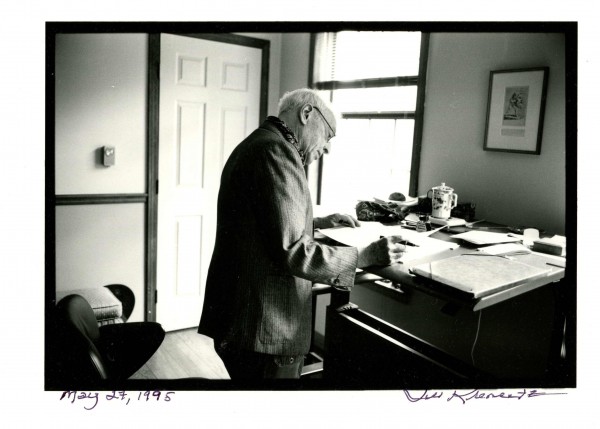
At last a documentary portrait of Saul Bellow
Perhaps in a moment of enthusiasm, the eminent critic James Wood wrote that Saul Bellow was the finest prose stylist of the twentieth century. Surprising we've waited till sixteen years after his death for someone called Asaf Galay (qualified: he previously did one about his great Yiddish forebear Isaac Bashevis Singer), to make a documentary film about a man who was the leading writer in America for decades, who received, besides the Pulitzer, the Nobel for Literature, and most deservedly.
Sadly, a bit late. In his heyday, which lasted about forty years, Bellow was a central figure in American, indeed English language, fiction. Now as Prof. Hana Wirth-Nesher says toward the end as a sort of postscript-epitaph, Bellow's writing is considered "offensive," and he is no longer read as much.. But this film, the first of its kind, however flawed or leaving room for comment and addition, is a superb piece of work and a pleasure to watch and even, for a lover of American fiction, a thrill. Here is the last great literary man from when one man could matter, the man, we learn, who turned the Hemingway sentence on its end and made it more inward and complex.
Literary reputations change. The "offensive" is on two counts: racism, noted in a passage in Bellow's (late, 2000) novel Ravelstein, read and commented on by the black novelist Charles R. Johnson; and, in considerably richer detail, misogyny, noted in many clearly autobiographical passages in various novels and evidenced in his behavior toward women as a man who had five wives and often depicted them unflatteringly in his pages.
No one of his five wives speaks ill of Bellow here. But two of the marriages were brief and ended acrimoniously. His fourth wife, a Romanian mathematician, says she felt after their eleven years together he simply was done with the experiment and ready to try something new. He married women younger, much younger, and the last time much, much younger: forty-seven years younger. But he was up to it, since at eighty-four he fathered a daughter by Janis, whom we hear from the most, reporting a happy, youthful-seeming union, and is worshipful and full of good memories. A man who has five wives must have a complex relation with the fair sex.
What we get here that we wouldn't get from a print biography is images, first of all, many handsome, nostalgic ones of the city of Chicago. The film also shows us many pages of the novels and lets us hear people, in some cases close relatives, read from them. Then there are all the people, in person, the children, the nephew, the admiring writers, the literary authorities.
Three very significant writers express in detail their debt to Saul Bellow and admiration for his work and his achievement: Salmon Rushdie, Martin Amis, and Philip Roth. Roth was his successor, almost his child and literally his friend. Luckily, Galay was able to interview Roth before his death in 2018. Rushdie and Amis show that to feel kinship with Bellow does not require one to be Jewish - or American.
They and other speakers make clear the lasting importance of Bellow's third novel, The Adventures of Augie March. So much so that its opening lines are to be read and remembered today, and are read and commented on here: "I am an American, Chicago born—Chicago, that somber city—and go at things as I have taught myself, free-style, and will make the record in my own way: first to knock, first admitted; sometimes an innocent knock, sometimes a not so innocent." The first part, "an American, Chicago born," has the sound of a Walt Whitman. The ending, Prof. Wirth-Nesher suggests, is a Jew speaking. A Jew has to knock. Whitman didn't.
That Bellow was a Jewish writer is central and this film clarifies how that worked and how the way it worked changed. For me the most enlightening words - though she is saying things she wrote decades ago - come from Vivian Gornick (whose In Search of Ali Mahmoud touched unique cords for me as someone with ties to Cairo). Bellow wrote as a Jew who was proudly American (though, interestingly, he was born in Canada), a Jewish writer who grew up constantly exposed to Yiddish, Hebrew, and English and became a master stylist and innovator in an American literary idiom he made his own. As Roth took up the mantle as the foremost American Jewish writer, the role of being Jewish became more of a shtick and could be played with and joked about as well as continuingly chronicled. Other Jewish writers, Bernard Malamud and above all J.D. Salinger, neither mentioned here, contributed to making Jewishness increasingly mainstream. And they mattered. But I see listed online an academic article (often cited, perhaps) called "The Death of the American Jewish Novel," dated 1978.
It seemed so important to read the Jewish writers in late Fifties and Sixties America. It was. This film shows how it doesn't matter in the same way any more and has not for decades. Gornick explains this is because Jews are so much more assimilated, as has been happening similarly, but later, to blacks and Hispanics (and latest, Asians).
Galay is judicious; the voices here feel essential, no one unnecessary. And we are also fortunate in hearing fairly often from Bellow himself, and even see him, laughing and chortling a little too much, perhaps in embarrassment, on the Dick Cavett show. Always he is the natty dresser with the nice suit, the jaunty hat, the bright bow tie, the bright smile, the fresh, smiling face, always vivacious, charming, sometimes a little too sure of himself. Not for him the diffident, perpetually tentative voice of that other, more recent, and half Jewish Nobel Prize winner in Literature, Patrick Modiano. (What would he say about Bob Dylan?) Bellow explains how it was fun to win the Nobel at first, but then it meant he and his wife had to hide - in Chicago. But he died at their summer place - in Massachusetts; and I feel that the film's promise of telling us about Chicago is not quite kept.
Nearly half of the novels are not mentioned. They don't talk about Henderson the Rain King. They never mention it, or Seize the Day. They do talk about The Adventures of Augie March, Herzog, Mr. Sammler's Planet, Humboldt's Gift, and Ravelstein. This choice perhaps reflects a biographical bias. The film is handily hung on the story of Bellow's five wives and how they figure in these novels. That is alright: this excellent film digs deep and enjoyably into the life, the man, and his place in the pantheon. Next time a filmmaker can reexamine that place (will he rise in a post-racial, post-#MeTo world?), and delve more deeply and widely into the novels. This film, with its fresh footage of key people and its balanced, enjoyable unfolding, is unlikely to be majorly bettered, though.
The Adventures of Saul Bellow, 84 mins., was screened for this review as part of the San Francisco Jewish Film Festival.
Last edited by Chris Knipp; 07-19-2021 at 10:03 PM.
-
THE CONDUCTOR (Bernadette Wegenstein 2021
BERNADETTE WEGENSTEIN THE CONDUCTOR (2021)
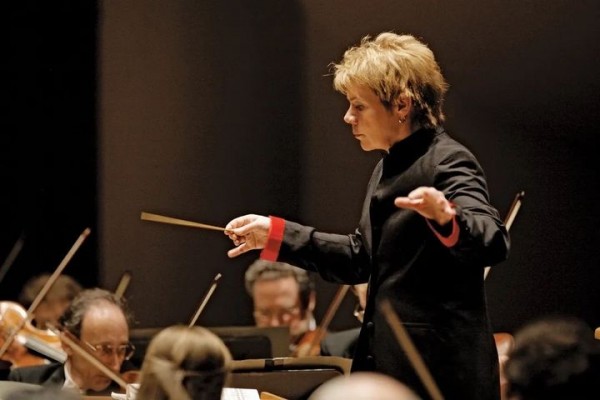
MARIN ALSOP IN THE OCNDUCTOR
TRAILER
Woman innovator of classical music
As the first and so far still the only woman conductor of a major American orchestra, Marin Alsop is a uniquely important person in the world of classical music. It is right that she should have a film portrait and Bernadette Wegenstein has provided an excellent one. This film is inspiring. It's full of joy as well as struggle. It should be seen by many. It can serve as an example and, yes, an inspiration to more women to break through the glass ceiling Alsop penetrated about fifteen years ago when she was named music director of the Baltimore Symphony Orchestra. She also has held that position with the Orchestra of São Paolo, Brazil and recently has assumed it with the Vienna Radio Symphony Orchestra.
Struggle and spirit dominate the film. Largely narrated by Alsop herself, it's full of humor and enthusiasm, the joy of making music; the inspiration of passing on the gift of classical music to disadvantaged youth and inspiring young people, especially young women, to become conductors. But there is no getting around the fact that she had a hard time getting where she is, and not an easy early life altogether. She grew up in a tiny basement apartment on the upper west side of Manhattan, the only child of classical musicians (a violinist and a cellist) who made little money and had to be working all the time. Her mother was severe. Her parents expected her to become a musician, preferably a pianist so they could be a piano trio. She hated the piano but became a violinist and studied at Juilliard and at Yale. She got degrees in violin at Juilliard in 1977 and 1978.
But from very early on she wanted above all to be a conductor. At the age of nine she says her father took her to a performance where Leonard Bernstein led an orchestra in a young people's concert with his typical vivacity and gyrations and knew that was what she wanted to do, and nothing else. But at Juilliard, she recounts an interview with a "tall, German, scary" conducting teacher who told her definitively No, a woman cannot conduct a symphony orchestra. She applied repeatedly and was rejected every time.
It's interesting to learn how Alsop worked around this, notably by starting her own groups, an all-female "swing" string group String Fever in 1981. And then, after that basic practice, with the financial support of Tomio Taki, a wealthy Japanese businessman at whose wedding she had played, she started the 50-piece Concordia Orchestra specializing in 20th-century American music. After that, frankly, it gets complicated. Major conductors have so many overlapping gigs over different time spans and in different countries it's hard to keep track of them. Importantly, Alsop has been a helper and teacher. Significent programs she has fostered are the The Taki Alsop Conducting Fellowship and the OrchKids program for underprivileged Baltimore children.
Her relationship with her first inspiration, Leonard Bernstein, turned out to be a magical one. After several tries, she gained admission to a Tanglewood summer conducting workshop. When she arrived there, Bernstein announced, "Where is this Marin Alsop I've been hearing about?" From then on he took her under his wing and went from being a teacher to a mentor and a friend and major supporter. This was a dream relationship for her. She has a big picture of Lenny in her office (she's not the only one).
But she tells a surprising story about herself and Bernstein. After many concerts where he rushed up to embrace and congratulate her dramatically after conducting, one time he stayed in the back and did not come forward. She went to him and asked if something was wrong. He said "I've been thinking. If I close my eyes when you're conducting, I can't tell if it's a man or a woman." She answered if he wanted to listen to her with his eyes closed, that was fine by her. The prejudices of the Old Boy Network of classical music lingered in Bernstein too.
It seems in the cases of both the BSO and São Paolo she may to some extent have lifted orchestras out of doldrums, and in fact a Brazilian orchestra person suggests São Paolo is similar to Baltimore, a city with problems, poverty, crime. She reports the BSO not having made many recordings for a while; São Paolo playing in a train station converted to a concert hall and the orchestra "hungry" for music. The filmmaker follows Alsop to Brazil and interviews people. The musicians like her, find her "clear" and authentic. With the Vienna orchestra, it was the other way around but also, Alsop says, good for her: coming to "the birthplace of classical music" as well as a place not traditionally friendly to women musicians, an environment that's severe and judgmental and imposes the highest standards. To do this, and still be relaxed and herself, she says has been a most valuable challenge. (She also makes an effort to speak both Portuguese and German: not here, but elsewhere, she has said she likes studying languages, though doesn't think herself particularly gifted that way.)
When Alsop came to lead the Baltimore Symphony Orchestra, it was a nightmare. Orchestra members raised an uproar, insisting they had not been sufficiently consulted. The reception was anything but friendly. It seemed like her appointment might not go through. How she straightened this out may be more complicated than can be fully explained in this film. A central event, though, was a personal talk she wangled with the musicians, though a friend who was coming as soloist who loaned her ten minutes of her time, with no board members present. Here, she spoke about outreach, promotion, and recording, and the musicians came around.
Conducting classes show Alsop to be a sure, incisive, and entertaining teacher. She is Director of Graduate Conducting at the Peabody Institute, Baltimore's music school, but her own Taki-Alsop Conducting Fellowship is what seems here to be most important in fostering female and minority conductors.
Her spouse is Kristin Jurkscheit, a former horn player she met at her gig previous to Baltimore as conductor of the Denver Symphony Orchestra (1993-2005). Jurkscheit now directs Taki-Alsop. We hear from her a bit; we briefly see the handsome house they share in Baltimore. We see their teenage son pursuing his passion, rock climbing, making a move that might make Alex Honnold gasp. One thing Alsop says stands out: that when someone comes to you and says something is their passion and they do not want to do anything else, you do not turn them away. "The one thing I never want to do to a young person is to tell them 'You're not' something, 'You can't do' something." She will not repeat the mistakes done to her. she makes sure her son knows he is loved and feels free to pursue his own dreams.
The film can't focus as much on the music because of all the social and biographical concerns. But it does show Alsop engaging with Mahler, Stravinsky, Mozart, and other musical loves, as well as engaged in a mind-blowing performance of a Bernstein Mass and being the first women in 118 years to preside Last Night of the Proms in London’s Royal Albert Hall — following the conductor's leading the BSO in annual tours of the UK. It feels like I'm being promotional, and it feels as if the film is too. But sometimes it has to be that way. About Marin Alsop there is much to admire and little to dislike. She has been a special positive influence on classical music and remains so.
The Conductor 90 mins., debuted at Tribeca June 2021. Screened for this review as part of the San Francisco Jewish Film Festival(July 22-Aug. 1, 2021) where it was presented as the centerpiece documentary. (Wednesday July 28, 2021 6:00 p.m.)
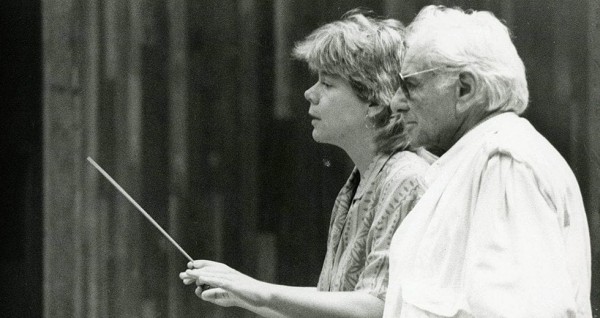
A YOUTHFUL MARIN ALSOP WITH LEONARD BERNSTEIN
Last edited by Chris Knipp; 07-19-2021 at 10:33 PM.
-
MY FATHER AND ME (Nick Broomfield 2029)
NICK BROOMFIELD: MY FATHER AND ME (2019)

MAURIE BROOMFIELD AND SON NICK
Portrait of a father and of a changing country
My Father and Me isn't like Nick Broomfield's searching, sometimes unpleasant documentaries but a warm and affectionate portrait of his late father, a great English industrial photographer - his work showed “the beauty and might of post-war industrial Britain” - the "industrial sublime" - who passed away at the age of 94, of whom Nick's son Barney, speaking with an American accent he must have learnt from his American mother, says "that is the kind of dude I want to be when I'm 94." Maurice is what Nick called him; he never liked being called "dad." (And remember you Yanks, the English pronounce Maurice "Morris.") Maurice had beautiful wife, like a movie star, who was a Czech Jewish refugee. She died rather suddenly at 60 from skin cancer, and Maurice feel into a very serous depression that lasted some years.
But he had a whole rebirth. His relations with Nick had long ago become warmer. Through art class, Maurice met Suzy, and the two of them clicked: a late-life id;ll ensued full of marvelous adventures. Through Nick's encouragement, Maurice's photographs were brought out. Many of the negatives had deteriorated from bad storage, but very attrative young women for the V&A came to catalogue and preserve them. The prints were exhibited in museums and Maurice basked in this renewed recognition.
These photographs reflect Maurice's origins in the industrial northern town of Derby (second Yank warning: pronounced "Darby"), whose grimness he kept mum about, and his father's leftist faith in factories and the working class. They are a kind of imagery not seen anymore, glamorous, staged, elaborately lighted portraits, but always with people, lovingly and flatteringly posed. Reprinted large and shown in a gallery it's clear what they are: works of art. The pacifism and humanism of the artist can be seen, I guess, in which of Nick Broomfield's 30-odd films his father liked best: Aileen Wuornos: The Selling of a Serial Killer, a film that shows the Wuornos' human side. A clip from it here shows that, for this is about Nick too.
There is plenty of footage and plenty of stills of Maurice, of Nick, of Barney - great friends apparently toward the end of Maurice's long life - and of the women in their lives who include Nick's American wife and early collaborator Joan Churchill. Shots and arcival clips of this family invariably show good looking people generally having a good time.
In a Times review of Nick's 1998 documentary Kurt and Courtney, an unrevealing but ultimately controversial portrait, Janet Maslin said his "offbeat investigative tactic" was "burrowing into scuzz." But she notes he's a "deceptively mild-mannered British filmmaker whose favorite interview question seems to be 'Really?' He's mild-mannered and understated here, but there's no "burrowing into scuzz." Maslin wound up finding the result engrossing. My direct experience of Brooomfield is his 2014 investigation Tales of the Grim Sleeper. He was present at the NYFF press screenings for that. But even more impressive to me was Nick's 2007 Battle for Haditha, a recreation of a real event in the Iraq war using real Iraqis speaking Iraqi ARabic and real Marines. Nick Broomfield is an impressive filmmaker and an influential one who ought to be more influential.
All that isn't much needed here, but the mild-mannered and understated English Jew is typically present, unconcealed, in this pleasant and interesting portrait of his father and the family context from which he comes. Incidentally this is a personal portrait of drastic and discomfiting changes occurring in England, especially to the industrial north, over the last century. All that honor, beauty and pride of the English industrial worker seems thrown away now. "Maurice found it heartbreaking that the skills and expertise of generations of the most highly trained craftsmen in the world were being allowed to die out. The pride of the working class community that Maurice had grown up in no longer existed." Alongside the pleasant fading away of a good looking, admirable old man accompanied by his loving and loved wife Suzy and loving son and grandson lurks this side truth that's quietly devastating.
My Father and Me, 97 mins., debuted at the New York Film Festival Oct. 2019; also shown at Chicago (Oct. 2019) and Tel Aviv (Docaviv) Jul. 2021. Screened for this review as part of the SFJFF, Ju.. 22-Aug. 1, 2021. BFI review.
Last edited by Chris Knipp; 07-19-2021 at 04:38 PM.
-
CHARLATAN (Agnieszka Holland 2020)
AGNIESZKA HOLLAND: CHARLATAN (2020)
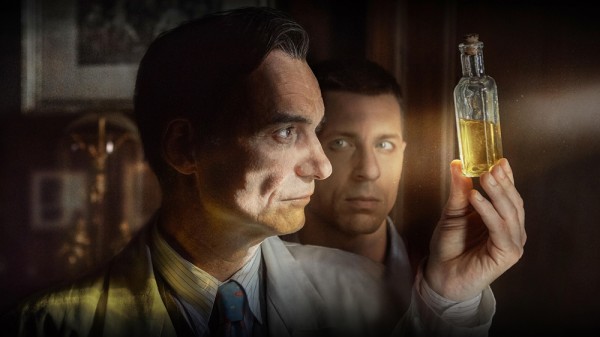
IVAN TROJAN AND JURAJ LOJ IN CHARLATAN
Natural healing and gay romancing
The 72-year-old Agnieszka Holland has been busy lately with Spoor (2017) and Mr Jones (2019) and now Charlatan (2020), about Jan Mikolášek (Ivan Trojan), the real life healer and herbalist who performed diagnoses by looking at flasks of urine. Am I alone in thinking she may be turning a little bit kooky herself? My favorites of her films remain Olivier Olivier, Europa Europa and The Secret Garden, from the early 1990's, plus Total Eclipse (1995) for the 20-year-old Leonardo DiCaprio's uniquely balls-out performance as Arthur Rimbaud. (Grégoire Colin was 16 when he starred in Olivier, Olivier.)
Charlatan is solid, old-fashioned filmmaking, a biopic of a real person with fictional embellishments. The nice cinematography switches back and forth between drab for the present and colorful for the past or for when things are going well for Mikolášek, whom we see fielding crowds of mostly poor patients (but :"I am not a doctor," he repeatedly says). The present time turns dark for him following the death of Czech Communist president Antonín Zápotocký in 1957 - whom Mikolášek had cured and who therefore protected him. He had had plenty of rich and powerful cures in his heyday, but exposés and attacks went on and at the coming of the new regime, finding Mikolášek an offense to modern enlightened communism or a threat to state medical authority, authorities arrest him and seek the death penalty. The charge is that he has caused several important people to take tea with strychnine and die. He would not have done that - in this movie he never does anything wrong as a healer, though in other ways plenty. Overlapping the present narrative sequence is a sequence of flashbacks to his youth. Young Mikolášek is nicely played by veteran actor Ivan Trojan's 18-year-old son Josep, who has the right looks and a pale, thin authority.
As we just saw with Mr. Jones and have seen before, Holland knows how to make a handsome-looking, atmospheric historical movie and this is fun to watch - except it doesn't all quite gel. Once the aging Mikolášek is arrested and held in prison, his goose appears to be cooked, so where's the suspense? The best parts seem to be the first, pristine ones with the pale, gifted Mikolášek learning from a peasant healer woman (Jaroslava Pokorná) and outdoing her, then as a full-fledged rich and famous pro doing the same thing only much more so and for money. We're asked to believe it's really possible accurately to diagnose specific diseases by looking at urine in the light, spotting gout, kidney ailments, heart trouble, gall bladder from color, viscosity, and little things floating around. Mikolášek seems to nail it every time and diagnoses one of four herbal compounds he has made up. Even the Nazi occupiers, with some convincing, swear by him.
Young Mikolášek is good and bad. When they want to cut off half his sister's leg because she has gangrene, he sneaks in and heals it overnight with an herbal poultice. Then when the old lady gives him a bag of kittens to drown "so they don't suffer" he dispatches them in a more violent manner she doesn't like - nor do we. There are hints of violence in his nature but they're not coherently integrated into the narrative.
A significant curlicue added to the story is a gay romance between youngish Mikolášek (a slightly awkward transition because Trojan senior has taken over at this point) and his new assistant, Frantisek Palko (Juraj Loj), a well muscled but poorly educated man he takes on anyway because there's an instant attraction. This is an invention by the writers based on Mikolášek's brief and unsuccessful marriage and his living with the assistant and implies the relationship lasts through the rest of Mikolášek's career. Palko has a wife at whom Mikolášek judiciously scowls. This gets complicated and fills out some lively but perhaps unnecessary flashback footage toward the end, with exteriors very nicely shot by dp Martin Strba and clasically edited by Pavel Hrdlicka. It feels as if the writers, Marek Epstein, Martin Sulc, and Jaroslav Sedlácek create a conflict in order to resolve it, but I didn't mind terribly because I so much admired the rhythmic editing of the final courtroom stairway sequence. But the Czech version of Wikipedia shows the film's final trial segment is sheer fabrication.
Charlatan, 118 mins., debuted at the Berlinale (Feb. 2020), Holland's third film to do so in recent years. It also featured at Pyeongchang, Transylvania, Odesa, Sofia, Moscow, Kyiv, Mill Valley and at least eight other international festivals in 2021, including Frameline (San Francisco). Screened for this review as part of the San Franciso Jewish Film Festival (Jul. 22-Aug. 1, 2021). Holland receives the SFJFF's 2021 Freedom of Expression award.
Last edited by Chris Knipp; 07-19-2021 at 10:53 PM.
-
WET DOG/NASSER HUND (Damir Lukacevic 2021)
DAMIR LUKACEVIC: EIN NASSER HUND/WET DOG (2021)
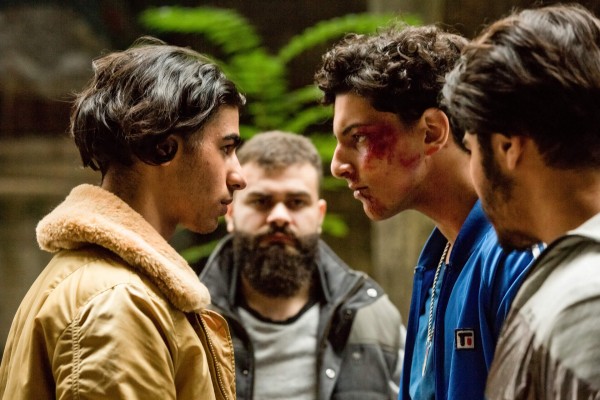
DOĞUHAN KABADAYI, MOHAMMAD ELIRAQUI AND OTHERS IN WET DOG
Adaptation of a German tale of hidden Jewishness among Arabs in Berlin
"Ein nasser Hund ist besser als ein trockener Jude" is a saying. "A wet dog is better than a dry Jew." Actually, in Iran. We learn that midway in this film. In German, because this takes place in Berlin. The family of Soheil (which, by the way, is an Arab name but not a Muslim one, see) has moved here from another German city, Göttingen. They immigrated from Iran. Now for the family businesses, they're in Wedding, a neighborhood of Berlin that has a lot of Arabs, Soheil complains. But he assimilates. Oh, does he assimilate.
The adept and appealing and effortlessly stylish young actor Doğuhan Kabadayı (who is German-Turkish, in fact) who plays Soheil looks very Middle Eastern. Maybe he could be a Sephardic Jew - or an Arab. He is thin and looks tall; dark, with big eyebrows, a long nose, thick lips, floppy black hair. He projects fun and confidence. From when he forces himself on a soccer game, he charms the local boys. The cool new kid on the block is a....Jew. In this feisty Berlin neighborhood "we're all one family, Turks, Arabs, Kurds..." they enthusiastically tell him when he says he's Iranian. Only not that. Not Jews. Not part of the "one family." After a bad experience wearing his Star of David neck chain at a market he leaves that at home and never mentions to anyone that he's a Jew. This is facilitated because of his looks and his confidence and because his family is not religious. They didn't give him a bar mitzvah, did not raise him as a Jew. He doesn't particularly think of himself as Jewish. But he did wear that Star of David chain. In Göttingen - not in Wedding.
Immediately he becomes a secret night graffiti artist, moniker "King Star." His giant tag appears everywhere. If this kid is 15 he is prodigious. Later, he reveals King Star is him, and he becomes a celebrity. The local gang welcomes him. He learns to hug and kiss everybody, call each other "habibi" and say "Assalamu alaykum." He even, when his new best friend Husseyn (Mohammad Eliraqui, nominated for a German newcomers award) begs him to, eventually dresses up and goes to the mosque with him - but he leaves abruptly, during prayer, feeling uncomfortable.
In a fight with another gang, Soheil uses a hand blade that's passed to him by Husseyn and boldly stabs a guy, immediately gaining increased cred. Nothing fazes Soheil. It all seems a lark to him. It's his father (Kida Khodr Ramadan) whom this hurts... when he finds out his son is a fledgling gangbanger.
Soheil attends the local high school, but the film seems most at ease doing gang fights and exploits, and the "multicultural" young German Arab-Turkish-Kurdish actors vividly create the feel of male camaraderie. The action might seem too schematic if it didn't have a clear relation to the eponymous autobiographical German bestseller by Arye Sharuz Shalicar. The fact that eventually Shalicar emigrated to Israel and became a member and then an official spokesman for the IDF suggests he had a knack for assimilation, and for violence.
Still it would all seem way too easy were it not for the charisma of the boys and the panache of Kabadayı. As a German review of the film on the programme guide Spielfilm says, he's "a real discovery" who "plays Soheil's development in all its facets very vividly" and is "just as engaging" as "a high-spirited street artist and rebel" as he is "as a shy lover and a courageous fighter for his convictions."
The film may have trouble with the big transitions. You'd think his pals' decision to rob the "Jew-lery" store that his father runs would stop Soheil but it doesn't seem to. He gets involved instead in a provocation (also impressing his buddies) by spray-painting a smiley face on a cop car in front of the store, which gets him arrested. Why his father is gentle and affectionate in retrieving him is a bit hard to figure.
It's a school provocation that finally brings Soheil "out." He paints a giant tag, "JUDE" (JEW) on a wall, which becomes a school scandal and hints at Soheil's desire to reveal himself, but he doesn't. (Perhaps he's inspired by Banksy. The book is set in the nineties but this film is set in the present.) He finally admits to the "JUDE" painting but what it means to him or to his parents isn't articulated. His father convinces him that he must acknowledge his Jewishness.
In a somewhat underwhelming and awkward scene, but also a fascinating one, Soheil slowly confesses to the gang that he is indeed the odious Jew one of them spotted in the store wearing the Star of David necklace at the beginning. It feels like Husseyn and the others want to hug him and forgive him, but the rules and the story don't allow it, and he walks out, leaving also Selma (Derya Dilber), his sweet Arab girlfriend.
Selma reappears, to hear his troubles:"For the Arabs I'm a Jew, for the Germans a Turk or an Arab, and for the Jews I'm a terrorist from Wedding," Soheil says, echoing the words on the book jacket. Indeed, when he visits a Jewish museum, he's received with suspicion. Some of the old gang try to betray him to the rival gang from Kreuzberg. Selma gets pregnant. Husseyn becomes a friend again - and Soheil becomes an Israeli, all in the blink of a final montage. Maybe they needed a miniseries - and a mindset complex enough to make this seem like more than a Young Adult novel.
The film was produced by Warner Brothers Germany, and an article on Deutsche Welle (DW)'s website about the making of the film shows much sincerity. All the cast members are Muslim, butl in workshopping they heard from a young Jew who'd suffered the same kind of ordeal as the protagonist/author. Kida Khodr Ramadan, who plays Soheil's father, is a Lebanese immigrant to Germany who grew up in Kreuzberg. He expressed concern that the anti-Semitism and resentment among groups are more open then when he was a student; he attributes it to social media. Kabadayı's Instagram shows he likes River Phoenix in Stand by Me, Ezra Miller in The Perks of Being a Wallflower ("The best and mosst beautiful coming of age film") and especially Ryan Gosling in Drive ("My favorite Neo Noir"). It's impossible not to like this young adtor and want to see more of him. His male costar Mohammad Eliraqui has a Brandoesque intensity.
Ein Yasser Hund/Wet Dog, 100 mins., is scheduled for release in Germany Jul. 29, 2021. It was screened for this review as the "Next Wave Spotlight" film of the San Francisco Jewish Film Festival (July 22-!utust 1, 2021), Suggested viewing time Friday July 30, 2021, 7:00 p.m. Available nationwide.
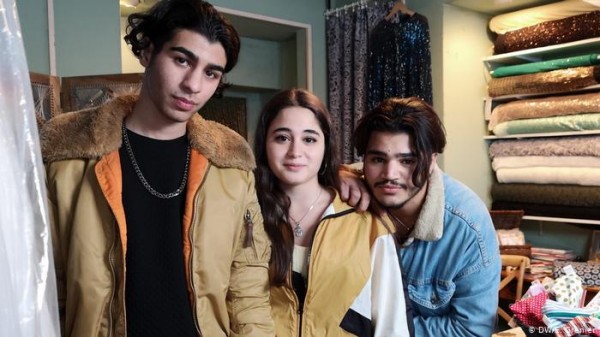
DOĞUHAN KABADAYI, DERYA DILBER, MOHAMMAD ELIRAQUI [/b]
Last edited by Chris Knipp; 09-08-2021 at 01:32 PM.
 Posting Permissions
Posting Permissions
- You may not post new threads
- You may not post replies
- You may not post attachments
- You may not edit your posts
-
Forum Rules





 Reply With Quote
Reply With Quote







Bookmarks